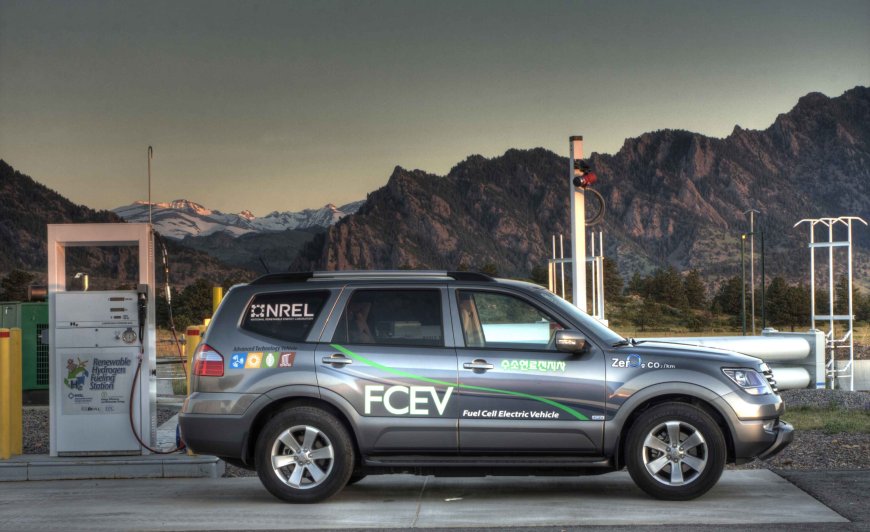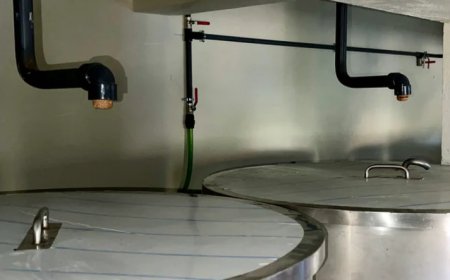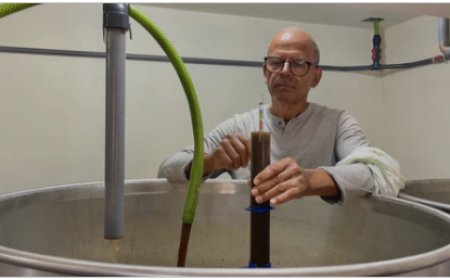Hydrogen: A Promising Fuel and Energy Storage Solution
Electrolysis-generated hydrogen may provide a solution to fluctuations in renewable-sourced energy. As electricity from renewable resources such as solar and wind becomes a larger portion of our nation's energy mix, the National Renewable Energy Laboratory (NREL) is examining strategies for accommodating the natural fluctuations in electricity that these sources generate. Hydrogen produced by renewable electrolysis offers a promising solution for both the electric power and transportation sectors.

Electrolysis-generated hydrogen may provide a solution to fluctuations in renewable-sourced energy.
As electricity from renewable resources such as solar and wind becomes a larger portion of our nation's energy mix, the National Renewable Energy Laboratory (NREL) is examining strategies for accommodating the natural fluctuations in electricity that these sources generate. Hydrogen produced by renewable electrolysis offers a promising solution for both the electric power and transportation sectors.
Energy Storage Opportunities
Renewable electrolysis is a process that uses electricity produced from renewables to split water into hydrogen and oxygen. The hydrogen can function as an energy storage medium, effectively storing renewable energy until a fuel cell or engine converts it back to electricity. Hydrogen can also be recombined with captured CO2 to produce a synthetic natural gas that can be used in power plants or transportation applications.
Hydrogen can be produced during off-peak periods or times when there is excess renewable electricity. Then, because it can be converted back to electricity to provide constant power when the renewable source isn't available, it helps stabilize the utility grid. In addition, excess hydrogen can be sold as a vehicle fuel or for other purposes.
"Energy storage opportunities continue to reveal themselves," said NREL Senior Engineer Kevin Harrison. "However, because of overall system inefficiencies, it can be a tough sell to use hydrogen in an energy arbitrage scenario, unless the energy system is on an island or other remote location. Still, because hydrogen has such a wide range of uses, combining hydrogen for bulk energy storage and vehicle fueling can make economic sense."
Wind-to-Hydrogen Project Brings Real-World Success
Developed in a partnership with Xcel Energy, NREL's Wind-to-Hydrogen Project serves as a working model of such a scenario. Housed at the National Wind Technology Center near Boulder, Colorado, this demonstration project integrates wind turbines and photovoltaic arrays with electrolyzer systems to produce hydrogen, which can be compressed and stored for later use.
As an example, some of this hydrogen is used as vehicle fuel that is dispensed at the site's hydrogen fueling station. The project's day-to-day operation provides real-world data, revealing opportunities for improving system designs and configurations to advance the commercialization of these technologies.
Using hydrogen for energy storage provides unique opportunities for integration between the power and transportation sectors. According to an NREL study, when an electrolyzer system produces enough hydrogen for energy storage plus an excess that can be used as vehicle fuel, it reduces the overall cost of generating the energy by about 6%.
"Renewable electrolysis is one of the most promising strategies for integrating large amounts of renewable energy into the utility grid," Harrison added. "Hydrogen's additional revenue streams give it an economic advantage over other bulk energy storage system options that use batteries, compressed air, or pumped water."
Written by Julia Thomas








































































